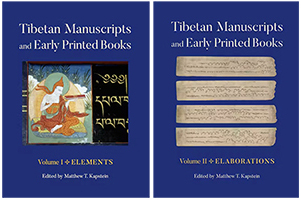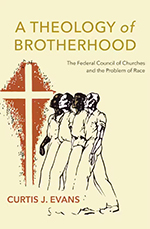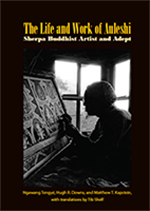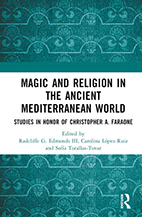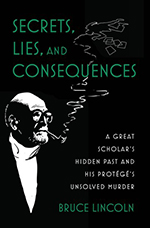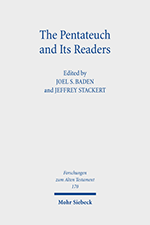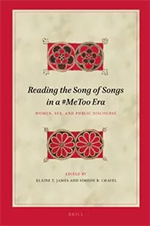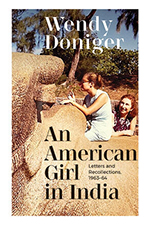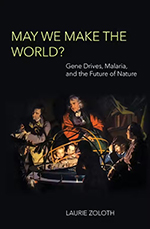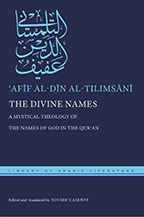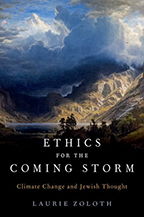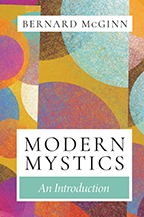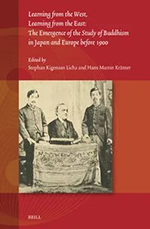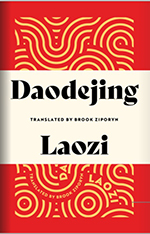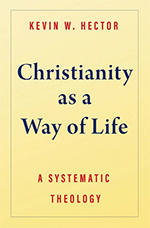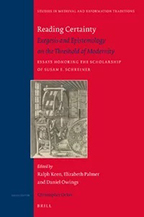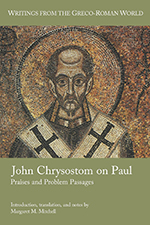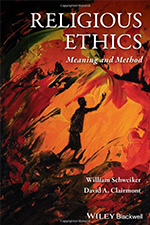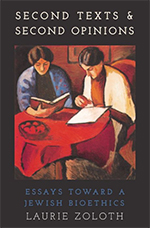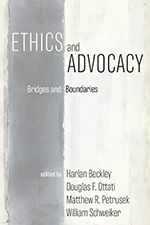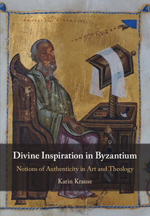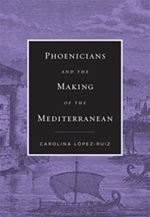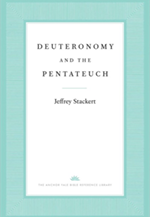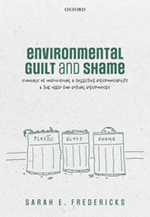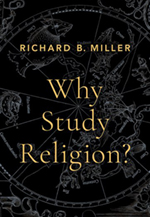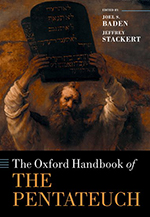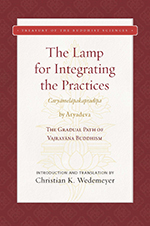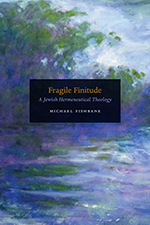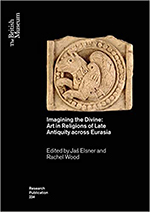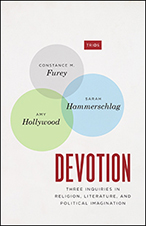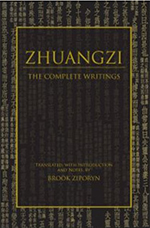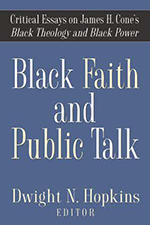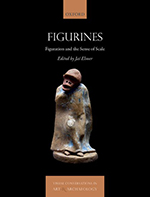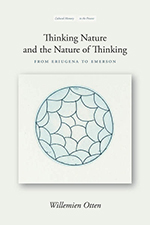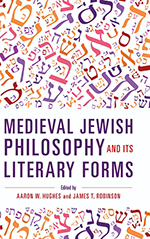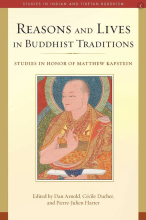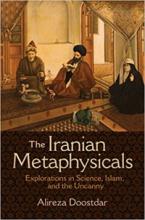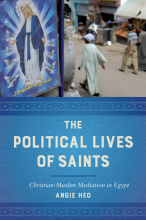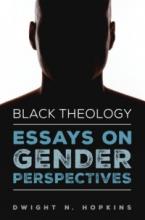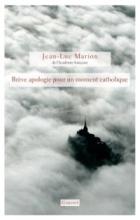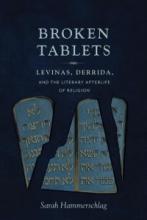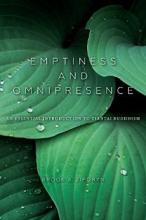Recent Books by Faculty
Also see recent works by alumni of the Divinity School
Published in 2025:
Fundamental to Islamic thought is the idea that there is a way that human beings simply are, by nature or creation. This concept is called fiṭra. In The Politics of Islamic Ethics: Hierarchy and Human Nature in the Philosophical Tradition, Raissa von Doetinchem de Rande, Assistant Professor of Religious Ethics, roots her investigation in the two central passages in the Qur'an and Hadith literature, where it is asserted that God created human beings in a certain way, the author moves beyond discussion of the usual figures who have commented on those texts to look instead at a group of classical Islamic philosophers rarely discussed in conjunction with ethical matters. Tracing the development of fiṭra through this overlooked strand of medieval thinking, von Doetinchem de Rande uses fiṭra as an entrée to wider topics in Islamic ethics. She shows that the notion of fiṭra articulated by al-Farabi, Ibn Bajja, Ibn Tufayl and Ibn Rushd highlights important issues about organizational hierachies of human nature. This, she argues, has major implications for contemporary political and legal debates.
Greek Mythology: From Creation to First Humans by Carolina López-Ruiz, Professor of Ancient Mediterranean Religions and Mythologies, is an accessible and nuanced overview of creation myths from the ancient Greek and Near Eastern worlds, informed by the understanding of the cultural and social context of the stories. Each chapter includes sections on how the myths connected with aspects of real life, whether religious and ritual, or political and social.
Lay Learning and the Bible in the Seventeenth-Century Atlantic World by Kirsten MacFarlane, Associate Professor of Early Modern Religious and Intellectual History, offers an alternative account of popular religion in early modernity by reconstructing a striking and unstudied community of seventeenth-century puritan immigrants to North America. Composed of tradespeople without a university education, this community offers unparalleled evidence for lay engagement with even the most abstruse and challenging concerns of contemporaneous biblical scholarship. Drawing on whatever resources they could find, this group taught themselves the languages of biblical criticism; immersed themselves in the most specialized questions of controversial theology; and then promulgated, through their hard-earned learning, an unprecedentedly inclusive vision of education, society, and the church. By recovering their lives and interests, this book presents a new vision of lay puritanism in the Atlantic world, one marked by far greater ambition, critical thought, and intellectual boldness than ever before suspected.
Published in 2024:
Embedded within the lengthy discourse on dharma in the Shanti and Anushasana Parvans of the Mahabharata are answers to a whole range of such questions—moral lessons from a dying Bhishma to King Yudhishthira, on life, death and everything in between. The Dharma of Unfaithful Wives and Faithful Jackals by Wendy Doniger is a highly entertaining selection of these tales—tangled at times, insightful at others, yet always quirky—about women, both good and bad, fathers and sons, kings, gods and kings of gods, and fables.
The winner of the 2024 Toshihide Numata Book Award by The Numata Center for Buddhist Studies at the University of California, Berkeley (NCBS).
In Tibetan Manuscripts and Early Printed Books, Volume I & Volume II, Matthew T. Kapstein (Numata Professor Emeritus of Buddhist Studies) and an international team of specialists provide a comprehensive introduction to the material and aesthetic features of the wide range of Tibetan books, described in detail and illustrated with copious full-color photographs, and explore the major categories of traditional Tibetan books, introducing their specific features and the main approaches to their study.
This exploration of the exceptional Buddhist stupa (reliquary mound) at Amarāvatī, one of ancient India’s most extraordinary monuments, presents a fresh perspective on the rich visual culture of ancient South Asia viewed through the lens of art history, connecting the stupa’s artistic innovations with advancements in Buddhist philosophy and rituals. In Amarāvatī: Art and Buddhism in Ancient India, Jaś Elsner offers new insights into early Buddhist art in South India, as well as a new understanding of the relationship between early Buddhism and its material culture. The excellent newly taken photographs, particularly those featuring objects from the British Museum in London, show in detail how the stupa communicated Buddhist teachings and practices to its followers, making this book an invaluable resource for students and scholars alike.
A Theology of Brotherhood: The Federal Council of Churches and the Problem of Race by Curtis J. Evans explores how the national umbrella Christian organization, the Federal Council of Churches, acted as a crucial conduit and organizational force for the dissemination of “progressive” views on race in the first half of the twentieth century.
Letters from prison testifying to deeply felt ethical principles have a long history, extending from antiquity to the present day. In the early modern era, the rise of printing houses helped turn these letters into a powerful form of political and religious resistance. In The Letter from Prison: Literature of Cultural Resistance in Early Modern England, W. Clark Gilpin, Margaret E. Burton Distinguished Service Professor Emeritus of the History of Christianity and Theology, examines how letter writers in England—ranging from archbishops to Quaker women—consolidated the prison letter as a literary form.
Drawing from a large collection of printed prison letters written from the reign of Henry VIII to the closing decades of the seventeenth century, Gilpin explores the genre's many facets within evolving contexts of reformation and revolution. The writers of these letters portrayed the prisoner of conscience as a distinct persona and the prison as a place of redemptive suffering where bearing witness had the power to change society.
Testimonial Montage: A Family of Israeli Holocaust Testimonies from the Cracow Ghetto Resistance explores interconnected testimonies of four Holocaust survivors who were members of the Akiva youth group in Cracow, Poland, who participated in the ghetto resistance. Drawing on literary and photographic discourse, Sheila Jelen, Professor of Religion, Literature and Visual Culture and History of Judaism, extracts the contours of personal narrative from the collective voice present in these interconnected testimonies. Attuned to stories of lost youth, sexual exploitation, and the dissolution of community and family, Jelen approaches Holocaust testimonies as one would members of a family with their shared experiences and common background, but also as individuals with their own unique voices. Departing from historical methodologies, Jelen models a different, wholistic approach to Holocaust testimonies, one which seeks to make sense of testimonies in the full breadth of their unfolding, across time, across space, and across genre.
The Sherpa Buddhist monk Ngawang Leksh (1913– 1983), familiarly known as Auleshi—a name that might be approximated as “Uncle Benedict” in English—occupies a unique place in the history of Buddhism in twentieth century Nepal. The Life and Work of Auleshi: Sherpa Buddhist Artist and Adept by Ngawang Tengye, Hugh R. Downs, and Matthew T. Kapstein, with translations by Tib Shelf, makes available what may be recalled of the monk’s life and work on the occasion of the hundred-and-tenth anniversary of his birth and the fortieth since his death. At once an accomplished artist and a yogi living always in retreat, Auleshi eschewed the trappings of a “Buddhist master” but taught instead through his art and, above all, his personal example. In this, he embodied the ideal of transmitting the Dharma without teaching a word.
Magic and Religion in the Ancient Mediterranean World
Studies in honor of Christopher A. Faraone
Edited by Radcliffe G. Edmonds III, Carolina Lopez-Ruiz, and Sofia Torallas-Tovar
This edited volume explores aspects of ancient magic and religion in the ancient Mediterranean, specifically ways in which religious and mythical ideas, including the knowledge and practice of magic, were transmitted and adapted through time and across Greco-Roman, Near Eastern, and Egyptian cultures. Offering an original and innovative combination of case studies on the material aspects and cross-cultural transfers of magic and religion, this book brings together a range of contributions that cross and connect sub-fields with a pan-Mediterranean, comparative scope.
Anand Venkatkrishnan, Assistant Professor of History of Religion in South Asia, revisits the historiography of the Bhagavata Purana to expand our knowledge of the many different religious and philosophical communities that interpreted and laid claim to the themes of the text. While most are associated with the traditions of Vaisnavism, Love in the Time of Scholarship: The Bhagavata Purana in Indian Intellectual History brings to light how Saivas, Saktas, and others also studied the Bhagavata on the periphery of the text's history.
Western philosophy is stuck in an irresolvable conflict between two approaches to the spiritual malaise of our times: either we need more God (the “turn to religion”) or less religion (the New Atheism). In Experiments in Mystical Atheism: Godless Epiphanies from Daoism to Spinoza and Beyond, Brook Ziporyn, Mircea Eliade Professor of Chinese Religion, Philosophy, and Comparative Thought, proposes an alternative that avoids both totalizing theomania and atomizing reductionism. What we need, he argues, is a deeper, more thoroughgoing, even religious rejection of God: an affirmative atheism without either a creator to provide meaning or finite creatures in need of it—a mystical atheism.
In the legacies of Daoism and Buddhism as well as Spinoza, Nietzsche, and Bataille, Ziporyn discovers a critique of theism that develops into a new, positive sensibility—at once deeply atheist and richly religious. Experiments in Mystical Atheism argues that these “godless epiphanies” hold the key to renewing philosophy today.
Published in 2023:
In Secrets, Lies, and Consequences: A Great Scholar’s Hidden Past and His Protégé’s Unsolved Murder, Prof. Emeritus Bruce Lincoln explores Mircea Eliade’s ties to a Romanian fascist movement in the 1930’s and the unsolved murder of his mentee, Ioan Culianu, in 1991.
The Pentateuch and Its Readers, edited by Joel Baden and Jeffrey Stackert, celebrates the contribution of Baruch J. Schwartz to the field of biblical studies through essays that treat the major foci of his research. These include the Pentateuch and its composition; priesthood, cult, and Priestly texts; major religious ideas expressed in the Hebrew Bible; and the reception of biblical texts and ideas (especially those related to the Pentateuch). A special emphasis of the essays on Pentateuchal composition is the neo-documentarian approach that Schwartz has long championed and taught to his students.
Reading the Song of Songs in a #MeToo Era, edited by Simeon Chavel and Elaine James. The Song of Songs is the only book of the Bible to privilege the voice of a woman, and its poetry of love and eroticism also bears witness to violence. How do the contemporary #MeToo movement and other movements of protest and accountability renew questions about women, gender, sex, and the problematic of the public at the heart of this ancient poetry? This edited volume seeks to reinvigorate feminist scholarship on the Song by exploring diverse contexts of reading, from Akkadian love lyrics, to Hildegard of Bingen, to Marc Chagall.
Twenty-two-year-old Wendy Doniger arrived in Calcutta in August 1963 on a scholarship to study Sanskrit and Bengali. It was her first visit to the country. Over the coming year—a lot of it spent in Tagore’s Shantiniketan—she would fall completely in love with the place she had, until then, known only through books. An American Girl in India documents this journey.
May We Make the World? Gene Drives, Malaria, and the Future of Nature by Laurie Zoloth is an engaging reflection on the history, nature, goal, and meaning of using a new technological idea—CRISPR-based genetic engineering—to alter the genome of the mosquito that carries malaria. In her sobering examination of the issue, Laurie Zoloth considers the leading ethical arguments for and against gene drives, explores the regulatory efforts that have emerged long in advance of the science, and considers the philosophical questions raised by the struggle to eliminate malaria.
The Divine Names: A Mystical Theology of The Names of God in the Qur'an, edited and translated by Yousef Casewit, is a philosophically sophisticated commentary on the names of God. Penned by the seventh-/thirteenth-century North African scholar and Sufi poet ʿAfīf al-Dīn al-Tilimsānī, The Divine Names expounds upon the one hundred and forty-six names of God that appear in the Qurʾan, including The All-Merciful, The Powerful, The First, and The Last. In his treatment of each divine name, al-Tilimsānī synthesizes and compares the views of three influential earlier authors, al-Bayhaqī, al-Ghazālī, and Ibn Barrajān. The Divine Names shows how a broad range of competing theological and philosophical interpretations can all contain elements of the truth.
In Ethics for the Coming Storm: Climate Change and Jewish Thought, Laurie Zoloth reexamines the usual narratives of Eden to consider how Biblical narratives and rabbinic commentary create a new language to understand and act in times of crisis. She considers how the classic analysis of creating doubt—seen as the ultimate sin in the Hebrew Bible—helps us to understand and critique the extraction industry. Zoloth argues for a creative exploration of philosophic and historical arguments for social ethics and social action, seeking a collective and not only an individual solution to global warming.
In Modern Mystics: An Introduction, Bernard McGinn argues that mysticism is not just a phenomenon of the past, but has been alive and flourishing in Christianity, Judaism, and Islam over the past century, as well as in many of the other religious traditions. Best understood as a search for the transforming presence of God, the mystical tradition has necessarily undergone changes and developments as it has confronted modernity and its frequently anti-religious stance. Making use of ten exemplary mystics of the 20th century, including Catholic, Protestants, and Jews, this book argues for the continued importance of mysticism in the modern world and studies its ongoing transformations.
Learning from the West, Learning from the East: The Emergence of the Study of Buddhism in Japan and Europe before 1900
Editors: Stephan Kigensan Licha and Hans-Martin Krämer
The essays collected in this edited volume by Stephan Kigensan Licha and Hans-Martin Krämer for the first time foreground the fundamental role Asian actors played in the formation of scholarly knowledge on Buddhism and the emergence of Buddhist studies as an academic discipline in Europe and Asia during the second half of the nineteenth century. The contributions focus on different aspects of the interchange between Japanese Buddhists and their European interlocutors ranging from the halls of Oxford to the temples of Nara. They break the mold of previous scholarship and redress the imbalances inherent in Eurocentric accounts of the construction of Buddhism as an object of professorial interest.
In Esoteric Zen, Stephan Kigensan Licha demonstrates tantric teachings and Zen were closely entwined movements that often developed within the same circles of thinkers and texts. Drawing on newly discovered manuscript materials, he shows how medieval practitioners constructed a unique form of Zen by drawing on tantric doctrinal discourses.
In Daodejing, Brook Ziporyn's translation is a transformative new edition of Taoism’s central text that overturns its reputation for calming, gnomic wisdom, revealing instead a work of “philosophical dynamite".
Focusing on Christianity’s core practices, Kevin Hector imagines Christianity as a Way of Life oriented toward wisdom, arguing that Christianity can be understood as a set of practices designed to transform one’s way of perceiving and being in the world. He examines practices that reorient people to God (eg singing or eating together), that transform our way of being in the world (prayer, wonder, vocation, etc.), and that reshape our way of being with others.
Published in 2022:
Reading Certainty: Exegesis and Epistemology on the Threshold of Modernity
Essays Honoring the Scholarship of Susan E. Schreiner
Edited by Ralph Keen, Elizabeth Palmer, and Daniel Owings
Reading Certainty offers incisive historical analysis of the foundational questions of the Christian tradition: how are we to read scripture, and how can we know we are saved? This collection of essays honors the work and thought of Susan E. Schreiner by exploring the import of these questions across a wide range of time periods. With contributions from renowned scholars and from Schreiner’s students from her more than three decades of teaching, each of the contributions highlights the nexus of certainty, perception, authority, and exegesis that has defined her scholarly work. Intellectual historians, early modernists, and scholars of Christianity will all appreciate this testament to Schreiner’s influence.
In this new volume in the Writings from the Greco-Roman World series--John Chrysostom on Paul: Praises and Problem Passages--Margaret M. Mitchell collects twenty-five of John Chrysostom’s lesser-known sermons on Pauline passages as well as some that focus on Paul himself. Mitchell presents the Greek text and an original translation of each of these fascinating sermons in a fresh, engaging style that seeks to recapture the vibrancy and dynamism of the live oratory behind the homilies. Extensive notes to each homily evaluate how Chrysostom dealt with some of the ethical, theological, historical, political, and literary problems present in Paul’s writings. Mitchell’s work on Chrysostom offers a model for scholars to explore and understand how ancient Christian interpreters found in Paul’s letters a legacy that was as problematic as it was precious.
In Religious Ethics: Meaning and Method, William Schweiker works to define the meaning of the field and present a distinct and original method for ethical reflection through comparisons of world religious traditions. This unique volume offers an innovative approach that reveals how religions concur and differ on moral matters,and provides practical guidance on thinking and living ethically. The book’s innovative method—integrating descriptive, normative, practical, fundamental, and metaethical dimensions of reflection—enables a far more complex and nuanced exploration of religious ethics than any single philosophical language, method, or theory can equal. The book moves through each of the five dimensions of reflection to compare concepts such as good and evil, perplexity and wisdom, truth and illusion, and freedom and bondage in various theological contexts.
In Second Texts and Second Opinions: Essays Towards a Jewish Bioethics, Laurie Zoloth takes as her book’s subject the intensely private discussions that arise when ordinary people confront life and death choices and struggle with decisions in a world of medical and scientific complexity. Her book explores the dilemmas presented in these cases and reflects on the competing, often incommensurate moral appeals offered by the participants. It then analyzes the cases against and with similar concepts within Jewish thought, using rabbinic texts to make legible the factors at play as one makes ethical judgments. This philosophical position is feminist as it considers and at times advocates for the inclusion of family and community in the rationale of the clinical setting. Intertwined with legal statements in the Talmud are aggadot,or midrashic texts, literary narratives used to argue a point, or to complicate a point, or to deepen the meaning of the communal discourse, adding history, case studies, or fictive tales to the discussion. Zoloth argues that these texts can be usefully applied to problems in bioethics. She develops the case for a textual turn that is fully imagined and enriched by the many possible re-interpretations of narrative: biblical, rabbinic, medieval, modern, and post-modern.
William Schweiker is editor of Ethics and Advocacy, which considers the connections and differences between critical reflection or moral arguments or narratives and advocacy for particular issues regarding justice and moral behavior and dispositions. The chapters in this volume share an interest in overcoming polarizing division that does not enable fruitful give-and-take discussion and even possible persuasive justifications. The authors all believe that both ethics and advocacy are important and should inform each other, but each offers a divergent point of view on the way forward to these agreed-upon ends. Their shared goal is to avoid academic withdrawal and to speak relevantly to the important issues of our day while halting--or at least mitigating--the disruptive discourse--almost shouting--that characterizes our polarized current society.
In Divine Inspiration in Byzantium, Karin Krause examines conceptions of divine inspiration and authenticity in the religious literature and visual arts of Byzantium. During antiquity and the medieval era, “inspiration” encompassed a range of ideas regarding the divine contribution to the creation of holy texts, icons, and other material objects by human beings. Krause traces the origins of the notion of divine inspiration in the Jewish and polytheistic cultures of the ancient Mediterranean and Near Eastern worlds and their reception in Byzantine religious culture. Exploring how conceptions of authenticity are employed in Eastern Orthodox Christianity to claim religious authority, she analyzes texts in a range of genres, as well as images in different media, including manuscript illumination, icons, and mosaics. Her interdisciplinary study demonstrates the pivotal role that claims to the divine inspiration of religious literature and art played in the construction of Byzantine cultural identity.
In Phoenicians and the Making of the Mediterranean, Carolina López-Ruiz writes the first comprehensive history of the cultural impact of the Phoenicians, who knit together the ancient Mediterranean world long before the rise of the Greeks. The Phoenician imprint on the Mediterranean lasted nearly a thousand years, beginning in the Early Iron Age. Following the trail of the Phoenicians from the Levant to the Atlantic coast of Iberia, López-Ruiz offers the first full study of the cultural exchange that transformed the Mediterranean in the eight and seventh centuries BC. This meticulous document and boldly argued text revises the Hellenocentric model of the ancient world and restores from obscurity the true role of the Near Eastern societies in the history of early civilizations. . This book was awarded the 2023 Frank Moore Cross book award, given by the American Schools of Overseas Research (ASOR).
In Deuteronomy and the Pentateuch, Jeffrey Stackert navigates readers through the major topics in the interpretation of Deuteronomy and its relationship to the other four Pentateuchal books. He considers the relationship between law and narrative, the role of Deuteronomy in Israel’s history, its composition and reception history, the influence of cuneiform legal and treaty traditions, textual and archaeological evidence from the Levant and Mesopotamia, and the status of Deuteronomy within the larger biblical canon. Stackert’s book introduces ongoing debates surrounding Deuteronomy and offers a contemporary evaluation of the latest textual and material evidence.
Published in 2021:
In Environmental Guilt and Shame: Signals of Individual and Collective Responsibility and the Need for Ritual Responses, Professor Sarah E. Fredericks documents the existence of environmental guilt and shame in the contemporary United States through the analysis of many popular texts offering the most comprehensive documentation of these phenomena to date and suggests that existing rituals need significant enhancement to fully address these moral emotions and the environmental degradation that catalyzes them.
In Why Study Religion?, Richard Miller, Laura Spelman Rockefeller Professor of Religion, Ethics, and Politics, asks: Can the study of religion be justified? He observes that scholarship in religious studies, especially work in “theory and method,” is preoccupied with matters of research procedure and thus inarticulate about the goals that can motivate scholarship in the field. Taking up these issues, Miller identifies and assesses six prevailing methodologies in the field that symptomatize this inarticulacy and then offers an alternative framework for thinking about the purposes of the discipline. Miller’s framework, Critical Humanism, theorizes about the ends rather than the means of humanistic scholarship, focusing on four values: Post-critical Reasoning, Social Criticism, Cross-cultural Fluency, and Environmental Responsibility. Ordered to such purposes, Miller argues, scholars of religion can relax their commitment to matters of methodological procedure and advocate for the value of studying religion.
The Oxford Handbook of the Pentateuch, edited by Jeffrey Stackert and Joel Baden, provides a comprehensive survey of key topics and issues in contemporary pentateuchal scholarship, situating its discussions of current developments in pentateuchal studies in relation to the field's long history. It addresses not only recent debates about the formation of the Pentateuch and their implications for biblical scholarship, but also engages with questions of archaeology and history, the Pentateuch and the Samaritans, the relation between the Pentateuch and other Moses traditions in the Second Temple period, the Pentateuch and social memory.
The Lamp for Integrating the Practices (Caryamelapakapradipa):The Gradual Path of Vajrayana Buddhism by Aryadeva, in this edition thoroughly annotated and translated by Christian K. Wedemeyer, is a systematic and comprehensive exposition of the most advanced yogas of the Esoteric Community Tantra (Guhyasamaja-tantra) as espoused by the Noble (Nagarjuna) tradition, an influential school of interpretation within the Mahayoga traditions of Indian Buddhist mysticism. This edition includes an introductory study discussing the history of the Guhyasamaja and its exegetical traditions, surveying the scriptural and commentarial sources of the Nagarjuna tradition, and analyzing in detail the contents of the Lamp, as well as a detailed, trilingual glossary.
It is through the symbolic forms of language that the human world of value is revealed; in Fragile Finitude: A Jewish Hermeneutical Theology, Michael Fishbane clears new ground for a theological life through a novel reinterpretation of the Book of Job. He offers a contemporary engagement with the four classical types of Jewish Scriptural exegesis. The first focuses on worldly experience, the second on communal forms of practice and thought in the rabbinical tradition, the third on personal development, and the fourth on transcendent, cosmic orientations.
Imagining the Divine: Art in Religions of Late Antiquity across Eurasia, edited by Jaś Elsner and Rachel Wood, brings together scholars of the art and archaeology of late antiquity (c. 200−1000), across cultures and regions reaching from India to Iberia, to discuss how objects can inform our understanding of religions. This volume specifically seeks to explore the ramifications of placing objects first and foremost in the comparative study of religions in late antiquity, and to consider the potential for interdisciplinary conversation to reinvigorate the field.
Devotion: Three Inquiries in Religion, Literature, and Political Imagination suggests different ways to characterize the object of devotion and the stance of the devout subject before it. What brings scholars of religion Sarah Hammerschlag (Professor of Religion and Literature, Philosophy of Religions and History of Judaism), Constance M. Furey, and Amy Hollywood together in this volume is a shared conviction that “reading helps us live with and through the unknown,” including times like these. They argue that what we read and what reading itself demands of us open new ways of imagining our political futures and our lives.
Published in 2020:
In Zhuangzi: The Complete Writings, Brook Ziporyn's carefully crafted, richly annotated translation of the complete writings of Zhuangzi—including a lucid introduction, a glossary of essential terms, and a bibliography—provides readers with an engaging and provocative deep dive into this magical work.
When Cone wrote Black Theology and Black Power, he signaled to the world that the American black faith tradition would no longer recognize the confines of the church walls as the extent of its purview in society. Black Faith and Public Talk, a collection of critical essays on James H. Cone's Black Theology and Black Power edited by Dwight N. Hopkins, continues Cone's theme of power in the public realm and examines the economic, political, cultural, gender, and theological implications of black faith and black theology.
Figurines: Figuration and The Sense of Scale, edited by Jaś Elsner, presents comparative case-studies of figurines in different ancient historical cultures, offering new accounts from China, Mesoamerica, Greece, and the late antique Mediterranean, examining the historical contexts for the end of figurine production and the impact of ideological change on the archaeological record. Accessibly written by four leading scholars working at the intersection of archaeology and the history of art, this volume is an attempt to put the category of the figurine on the table as a key conceptual and material problematic in the art history of antiquity. At stake are issues of figuration and anthropomorphism, miniaturization and portability, one-off production and replication, and substitution and scale at the interface of archaeology and art history.
In Thinking Nature and the Nature of Thinking: From Eriugena to Emerson, Willemien Otten puts medieval Irish theologian John Scottus Eriugena (810–877) into conversation with American philosopher Ralph Waldo Emerson (1803–1882). Challenging the biblical stewardship model of nature and histories of nature and religion that pit orthodoxy against the heresy of pantheism, Otten reveals a line of thought that has long made room for nature's agency as the coworker of God. Embracing this more elusive idea of nature in a world beset by environmental crises, she suggests, will allow us to see nature not as a victim but as an ally in a common quest for re-attunement to the divine.
Published in 2019:
Medieval Jewish Philosophy and Its Literary Forms, edited by James T. Robinson and Aaron W. Hughes, considers Jewish philosophy in the medieval period and the connections that medieval Jewish thinkers made between the literary, the exegetical, the philosophical, and the mystical to shed light on the creativity and diversity of medieval thought. As they broaden the scope of what counts as medieval Jewish philosophy, the essays collected here consider questions about how an argument is formed, how text is put into the service of philosophy, and the social and intellectual environment in which philosophical texts were produced.
Maimonides’ Guide of the Perplexed in Translation: A History from the Thirteenth Century to the Twentieth, edited by James T. Robinson, Josef Stern, and Yonatan Shemesh, is the first volume to tell the story of the translations and translators of Maimonides’ Guide and its impact in translation on philosophy from the Middle Ages to the present day. This interdisciplinary collection of essays first traces the history of the translations of the Guide, from medieval to modern renditions and then surveys its influence in translation on Latin scholastic, early modern, and contemporary Anglo-American philosophy, as well as its impact in translation on current scholarship.
Reasons and Lives in Buddhist Traditions: this collection of essays pays tribute to Matthew Kapstein, Numata Professor of Buddhist Studies, a luminary in the field, by exemplifying some of the diverse work in Buddhist and Asian studies that has been impacted by his scholarship and teaching. Engaging matters as diverse as the legal foundations of Tibetan religious thought, the teaching careers of modern Chinese Buddhists, the history of Bhutan, and the hermeneutical insights of Vasubandhu, these essays are offered as testament to a singular scholar and teacher whose wide-ranging work is unified by a rare intellectual selflessness. Edited by Daniel A. Arnold, Associate Professor of Philosophy of Religions.
In Dark Lens: Imaging Germany, 1945, Françoise Meltzer, Edward Carson Waller Distinguished Service Professor in the Humanities and Professor of Philosophy of Religions, explores questions around the images of war ruins in Nazi Germany to investigate problems of aestheticization, the representation of catastrophe, and the targeting of civilians in war.
Published in 2018:
The Iranian Metaphysicals: Explorations in Science, Islam, and the Uncanny by Alireza Doostdar, Assistant Professor of Islamic Studies and the Anthropology and Sociology of Religion, shows that metaphysical experimentation lies at the center of some of the most influential intellectual and religious movements in modern Iran. These forms of exploration have not only produced a plurality of rational orientations toward metaphysical phenomena but have also fundamentally shaped what is understood as orthodox Shi‘i Islam, including the forms of Islamic rationality at the heart of projects for building and sustaining an Islamic Republic. Winner of the 2018 Albert Hourani Book Award from MESA, the Middle East Studies Association.
The Political Lives of Saints: Christian-Muslim Mediation in Egypt by Angie Heo, Assistant Professor of the Anthropology and Sociology of Religion journeys into the quieter corners of divine intercession to consider what martyrs, miracles, and mysteries have to do with the routine challenges faced by Christians and Muslims living together under the modern nation-state. Drawing on years of extensive fieldwork, Angie Heo argues for understanding popular saints as material media that organize social relations between Christians and Muslims in Egypt toward varying political ends. With an ethnographer’s eye for traces of antiquity, she deciphers how long-cherished imaginaries of holiness broker bonds of revolutionary sacrifice, reconfigure national sites of sacred territory, and pose sectarian threats to security and order. A study of tradition and nationhood at their limits, The Political Lives of Saints shows that Coptic Orthodoxy is a core domain of minoritarian regulation and authoritarian rule, powerfully reversing the recurrent thesis of its impending extinction in the Arab Muslim world.
Published in 2017:
The Mystics of al-Andalus: Ibn Barrajān and Islamic Thought in the Twelfth Century by Yousef Casewit, Assistant Professor of Qur'anic Studies, focuses on the twelfth century CE, a watershed moment for mysticism in the Muslim West. In al-Andalus, the pioneers of this mystical tradition, the Mu'tabirun or 'Contemplators', championed a synthesis between Muslim scriptural sources and Neoplatonic cosmology. Ibn Barrajān of Seville was most responsible for shaping this new intellectual approach, and is the focus of Casewit's book.
What do African American men have to do with gender? In Black Theology: Essays on Gender Perspectives, Professor of Theology Dwight N. Hopkins draws on over thirty-five years of wrestling with these questions. Too often gender is seen as a "woman's only" discussion. But in reality, men have a gender too. Some say it is biological; others claim it has to do with socialization. Hopkins's career has focused on defining what a black American man is, and how he builds bridges of support and engagement with women.
Brève apologie pour une moment catholique: Jean-Luc Marion, Andrew Thomas Greeley and Grace McNichols Greeley Professor of Catholic Studies and Professor of the Philosophy of Religions and Theology, explores the possibility that this could be an extraordinary moment in French history.
Published in 2016:
Broken Tablets: Levinas, Derrida, and the Literary Afterline of Religion by Sarah Hammerschlag, Associate Professor of Religion and Literature, Philosophy of Religions and History of Judaism, is a reexamination of Derrida and Levinas's textual exchange. The book not only produces a new account of this friendship but also has significant ramifications for debates within Continental philosophy, the study of religion, and political theology.
Varieties of Gifts: Multiplicity and the Well-Lived Pastoral Life is by Cynthia Gano Lindner, Director of Ministry Studies. The practice of ministry in our rapidly changing, increasingly diverse context is a complicated business. Varieties of Gifts highlights the stories of ministers who thrive in this environment, offering inspiration to readers—ministers, seminary students, and people who care for them—on engaging their own multiplicity to build healthy, sustainable ministry.
Friends and Other Strangers: Studies in Religion, Ethics, and Culture by Richard B. Miller, Laura Spelman Rockefeller Professor of Religious Ethics, seeks to chart and expand the field of religious ethics by exploring the implications of taking a cultural turn in the humanities and social sciences.
Emptiness and Omnipresence: An Essential Introduction to Tiantai Buddhism by Brook A. Ziporyn, Professor of Chinese Religion, Philosophy, and Comparative Thought, puts Tiantai into dialogue with modern philosophical concerns to draw out its implications for ethics, epistemology, and metaphysics. Ziporyn reveals the profound insights of Tiantai Buddhism while stimulating philosophical reflection on its unexpected effects



